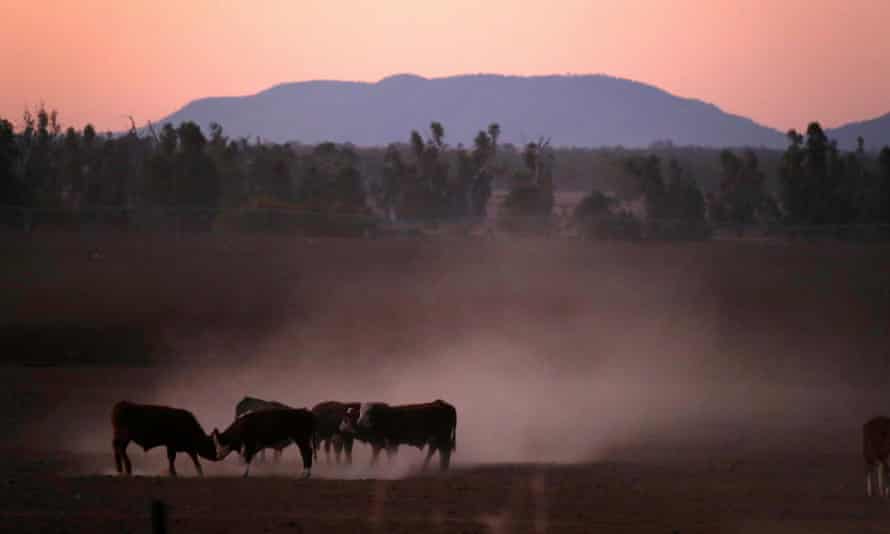‘Square the ledger’: farmers push Nationals for dedicated income stream in emissions reduction policy
The National Farmers’ Federation is demanding Nationals MPs drive a hard bargain for agriculture in any deal ahead of Cop26 climate talks

Last modified on Sun 10 Oct 2021 12.31 EDT
Australia’s peak farming lobby will demand Nationals MPs ensure the Scott Morrison government gives farmers a dedicated income stream from sequestered carbon in the event the Coalition lands a new mid-century emissions reduction policy ahead of the Cop26 in Glasgow.
The National Farmers’ Federation (NFF) will meet Nationals MPs virtually on Monday as the Morrison government attempts to land an internal agreement on what new emissions reduction policies Australia will flag before the international climate conference in November.
In a statement ahead of Monday’s session with MPs, the NFF president Fiona Simson said the Nationals needed to drive a hard bargain for agriculture. Simson suggested the government needed to compensate landholders for land clearing regulations that pre-dated the Kyoto period as a goodwill exercise.
The NFF was a vocal opponent of emissions reduction efforts, like Labor’s carbon price, in the past. But, now – like many other major business organisations – the peak farm organisation has changed its tune.
The NFF supports an economy-wide aspiration of net zero emissions by 2050, but with two conditions. It says emissions reduction needs to be economically viable, and farmers must not be burdened by “unnecessary regulation”.
Morrison has been clear for months he would like to land an agreement on net zero in time for Cop26, but some Queensland Nationals are signalling trenchant opposition.
In order to try and persuade a majority of the Nationals party room to accept a mid-century commitment, senior government players have been signalling agriculture will likely be excluded from any heavy lifting on abatement – but not from the income streams associated with carbon sequestration.
The resources minister, Keith Pitt, also said last week the Liberals should consider being a lender and insurer of last resort for fossil fuel projects struggling to get finance because banks are required by regulators to minimise carbon risk during the transition to low emissions – an initiative Pitt costed at $250bn.
Simson will brief Nationals MPs on Monday with Georgie Somerset, the president of Agforce Queensland. The NFF president contends that in the past, Queensland and New South Wales farmers were unwitting victims of land clearing legislation “that removed their property rights, without compensation”.
Simson declared it was now time to “square the ledger” by allowing farmers income from the Emissions Reduction Fund and from Australian carbon credit units.
She argued farmers needed to maintain control of their asset. “The rights to use … sequestered carbon should be vested in the landowner, not the government, nor an international accounting mechanism that doesn’t count surpluses”.
“Fixing this will go a long way to ensuring farmers are enthusiastic participants and supporters of future emission reduction solutions,” Simson said.
Simson also declared Australia’s pathway to achieving carbon neutrality by mid-century should not be forged by significant locking up of productive farmland.
“Government must not expect prime farm land to be converted to a massive carbon sink,” the NFF president said. “Farmers have a job to feed and clothe the world and to power the nation’s economy”.
Quick GuideHow to get the latest news from Guardian AustraliaShow

Email: sign up for our daily morning briefing newsletter
App: download the free app and never miss the biggest stories, or get our weekend edition for a curated selection of the week’s best stories
Social: follow us on YouTube, Facebook, Instagram, Twitter or TikTok
Podcast: listen to our daily episodes on Apple Podcasts, Spotify or search “Full Story” in your favourite app
The NFF’s intervention in the government’s high stakes internal policy debate follows a call by the Business Council of Australia (BCA) for the government to adopt a stronger medium term emissions reduction target ahead of Cop26.
Despite branding a proposed 45% emissions reduction target advanced by Labor during the last federal election as “economy wrecking” – the business council is now arguing Australia can reduce emissions by 46 to 50% by 2030 against 2005 levels.
The BCA also supports a net zero pledge.
It is proposing a reworking of the current safeguards mechanism to achieve that end. But the minister for energy and emissions reduction, Angus Taylor, told Nine newspapers at the weekend the proposal was akin to a “carbon tax”.
A report by the thinktank the Grattan Institute published on Sunday night called for a greater policy focus on carbon offsets, including CO2 sequestered in vegetation and soil. It argued offsets would be vital to meet a net zero target, and could be part of a low-cost climate policy, but must not be used as an excuse to delay emissions cuts.
The institute recommended governments better articulate the role of offsets in each climate policy, including any limits on their use, and improve the integrity of offsetting systems by spending more on independent expert reviews.
It also called for rules to prevent double-counting of offsets produced in Australia but then used overseas, and investment in research, development and deployment of technologies to remove carbon dioxide from the atmosphere, such as direct air carbon capture and storage and large-scale mineralisation.
Tony Wood, Grattan’s energy and climate change program director, said offsetting would be required as emissions from some sources could not be easily eliminated, or would prove prohibitively expensive. But he said governments should take an “avoid emissions first” approach.
The federal government’s carbon offset system has been repeatedly criticised, including in a recent report by the Australian Conservation Foundation and the Australia Institute that suggested about a fifth of credits created through the emissions reduction fund did not represent real cuts in CO2. The government recently approved a controversial plan to grant carbon credits to fossil fuel projects that use carbon capture and storage.